Top 10 Greatest Scientists in History
Science has been an integral part of human history, pushing the boundaries of our knowledge and understanding of the world around us. From ancient philosophers to modern-day researchers, scientists have made groundbreaking discoveries that have changed the course of human history.The list of the greatest scientists in history is a tribute to those individuals whose work has had a significant impact on the scientific community and on society as a whole. These individuals have dedicated their lives to the pursuit of knowledge, pushing the boundaries of what we know and unlocking the secrets of the universe.
From the brilliant mind of Albert Einstein to the groundbreaking research of Marie Curie, the list of the greatest scientists in history is a testament to the power of human curiosity and determination. These individuals have overcome incredible challenges and obstacles, all in the name of advancing our understanding of the world.
As we look back on the history of science, it is clear that these individuals have left a lasting legacy, inspiring future generations to continue their work and build upon their discoveries. From the creation of life-saving vaccines to the development of groundbreaking technologies, the contributions of these scientists have touched every aspect of our lives.
So, let's celebrate the achievements of these remarkable individuals and vote for the greatest scientists in history. By recognizing their contributions, we honor their memory and inspire future generations to continue their quest for knowledge and understanding.
 Isaac Newton, an English mathematician, physicist, and astronomer, is widely regarded as one of the most influential scientists in history. He formulated the laws of motion and universal gravitation, which laid the groundwork for classical mechanics, and he also made significant contributions to the development of calculus.
Isaac Newton, an English mathematician, physicist, and astronomer, is widely regarded as one of the most influential scientists in history. He formulated the laws of motion and universal gravitation, which laid the groundwork for classical mechanics, and he also made significant contributions to the development of calculus. His scientific achievements are foundational as much as they are significant. Moreover, he did all this while serving as a member of parliament and being the head of the Royal Mint.
He is the father of mechanics, optics, and the inventor of the reflecting telescope, as well as the creator of calculus. Definitely the greatest scientist of all time.
He should be at number 1 because he is the only scientist who worked on every field of Physics, whether it be light, sound, or air. He even worked on motion and rest and on nuclear science.
 Albert Einstein, a theoretical physicist, is best known for his theory of relativity, which revolutionized our understanding of space, time, and gravity. He also developed the famous equation E=mc², which illustrates the relationship between energy and mass. Einstein was awarded the Nobel Prize in Physics in 1921.
Albert Einstein, a theoretical physicist, is best known for his theory of relativity, which revolutionized our understanding of space, time, and gravity. He also developed the famous equation E=mc², which illustrates the relationship between energy and mass. Einstein was awarded the Nobel Prize in Physics in 1921. Gotta be the most quoted, well-known, and overall the most influential scientist of all time. And all the things he discovered too... Totally changed the face of science on all accounts. A well-deserved 1st place.
A genius is not just about being good at something or even the best at something. It is about how one views the universe - as objective as humanly possible - without the screens of emotions, fear, and ignorance. Einstein was truly the greatest genius!
Albert Einstein, my favourite scientist of all time, my role model, and he is a god for me. Incredible and superintelligent mind of all time in the world.
 Galileo Galilei, an Italian astronomer, physicist, and mathematician, is often referred to as the "father of modern science." He played a major role in the scientific revolution, making significant discoveries in the fields of astronomy, physics, and engineering. Galileo is best known for his improvements to the telescope and his support of the heliocentric model of the solar system.
Galileo Galilei, an Italian astronomer, physicist, and mathematician, is often referred to as the "father of modern science." He played a major role in the scientific revolution, making significant discoveries in the fields of astronomy, physics, and engineering. Galileo is best known for his improvements to the telescope and his support of the heliocentric model of the solar system. Galileo's work is what led Newton into mathematics, and calculus is what made Einstein's genius possible. Give some respect to the father of modern science.
He is the first person who treated physics as the only possible weapon to explore the cosmos.
It's a shame he never lived to receive the praise he has now.
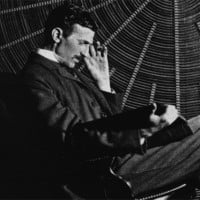 Nikola Tesla, a Serbian-American inventor, electrical engineer, and physicist, contributed to the development of alternating current (AC) electrical systems and pioneered research into wireless communication, radar, and X-ray technology. He also worked on the development of the induction motor, the Tesla coil, and early neon lighting.
Nikola Tesla, a Serbian-American inventor, electrical engineer, and physicist, contributed to the development of alternating current (AC) electrical systems and pioneered research into wireless communication, radar, and X-ray technology. He also worked on the development of the induction motor, the Tesla coil, and early neon lighting. Greatest scientist of all time. Astonished that he is not in 1st place. Have you ever heard of ball lightning? Till now, it's a rare phenomenon, and scientists can't perform this in their labs, but Tesla did it in the 1890s.
This dude was just brilliant! Had vision, had intuition, had the creativity. Certainly, most responsible for the larger scale 20th-century technological advancements and beyond.
I'd go for Einstein, but Tesla has different views on why he invents things. Think about it, if J.P. Morgan hadn't cut the funds for his experiment, we could've experienced free electricity right now. And I think it's because of him we have Wi-Fi.
 Louis Pasteur, a French chemist and microbiologist, is best known for his groundbreaking discoveries in the fields of germ theory, vaccination, and pasteurization. His work laid the foundation for modern immunology and the prevention of infectious diseases, and he is often referred to as one of the fathers of microbiology. Pasteur's research has saved countless lives through improved sanitation, food safety, and the development of vaccines.
Louis Pasteur, a French chemist and microbiologist, is best known for his groundbreaking discoveries in the fields of germ theory, vaccination, and pasteurization. His work laid the foundation for modern immunology and the prevention of infectious diseases, and he is often referred to as one of the fathers of microbiology. Pasteur's research has saved countless lives through improved sanitation, food safety, and the development of vaccines. He's a great scientist who has helped millions of lives. For sure, he has to be one of the top 3 best scientists of all time!
He's responsible for the existence of vaccines. Without him, many people would die from several diseases.
He is a really helpful and smart man, helping millions of people's lives.
 Marie Curie, a Polish-born physicist and chemist, is renowned for her pioneering research on radioactivity. She was the first woman to win a Nobel Prize, and she remains the only person to have won Nobel Prizes in two different scientific fields—physics and chemistry. Curie's work led to the discovery of polonium and radium and helped lay the groundwork for modern nuclear science.
Marie Curie, a Polish-born physicist and chemist, is renowned for her pioneering research on radioactivity. She was the first woman to win a Nobel Prize, and she remains the only person to have won Nobel Prizes in two different scientific fields—physics and chemistry. Curie's work led to the discovery of polonium and radium and helped lay the groundwork for modern nuclear science. She's pretty much the source of our knowledge about radioactivity and X-Rays. Her discoveries have immense implications in medicine and things like nuclear power. I'm surprised and disheartened that she and Charles Darwin aren't higher on the list.
A woman who made a great contribution to the world of science. A woman who's under the discovery of radioactivity. I hope many women will follow her steps.
When the whole world was dominated by male scientists, she was the one who inspired many young girls to take up science.
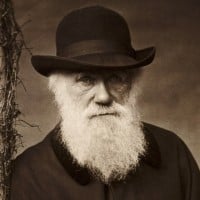 Charles Darwin, an English naturalist and biologist, is best known for his theory of evolution by natural selection. His influential book, "On the Origin of Species," laid the foundation for modern evolutionary biology and challenged the prevailing beliefs about the origins of life on Earth. Darwin's work has had a profound impact on various scientific disciplines and our understanding of the natural world.
Charles Darwin, an English naturalist and biologist, is best known for his theory of evolution by natural selection. His influential book, "On the Origin of Species," laid the foundation for modern evolutionary biology and challenged the prevailing beliefs about the origins of life on Earth. Darwin's work has had a profound impact on various scientific disciplines and our understanding of the natural world. The greatest scientific mind of all time. His theory of evolution should actually be a law as well proven as the law of gravity. To say that you don't "believe" in evolution is like saying that you don't believe in breathing.
This man should be higher. The hardest thing in science is to be able to see things that others can't refuse to. Another out-of-the-box thinker.
Most scientists work within a framework. Darwin created the framework. It's on his shoulders that biologists stand.
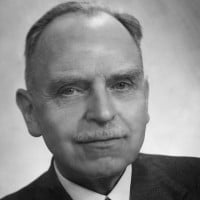 A German chemist and physicist, this scientist is often called the father of nuclear chemistry for his discovery of nuclear fission. His work laid the groundwork for the development of nuclear energy and the atomic bomb. He was awarded the Nobel Prize in Chemistry in 1944.
A German chemist and physicist, this scientist is often called the father of nuclear chemistry for his discovery of nuclear fission. His work laid the groundwork for the development of nuclear energy and the atomic bomb. He was awarded the Nobel Prize in Chemistry in 1944. Stephen Hawking, a British theoretical physicist and cosmologist, is known for his groundbreaking work on black holes, general relativity, and quantum mechanics. He is also famous for his best-selling book, "A Brief History of Time," which popularized complex scientific concepts for a general audience. Despite living with a debilitating motor neuron disease, Hawking continued to make significant contributions to the field of theoretical physics.
Stephen Hawking, a British theoretical physicist and cosmologist, is known for his groundbreaking work on black holes, general relativity, and quantum mechanics. He is also famous for his best-selling book, "A Brief History of Time," which popularized complex scientific concepts for a general audience. Despite living with a debilitating motor neuron disease, Hawking continued to make significant contributions to the field of theoretical physics. When I came to know he was not physically fine, I got the "The most inspiring scientist of all time." This legend shows that impossible is just in mind. Salute to this legend who tried to change the world by just thinking...
With his breakthrough scheme ever noted in the history of science, "The Grand Design", although being physically disabled, he proved what man can accomplish if he dares to hope.
He should be #1! Come on, people! Please vote for him. He has earned so much fame, even though he had Amyotrophic Lateral Sclerosis! Just imagine his struggles! Please vote for him, until he reaches #1!
 James Clerk Maxwell, a Scottish physicist and mathematician, made significant contributions to the fields of electromagnetism and the kinetic theory of gases. He formulated the classical theory of electromagnetic radiation, which united electricity, magnetism, and light under a single framework, and his equations continue to underpin much of modern physics.
James Clerk Maxwell, a Scottish physicist and mathematician, made significant contributions to the fields of electromagnetism and the kinetic theory of gases. He formulated the classical theory of electromagnetic radiation, which united electricity, magnetism, and light under a single framework, and his equations continue to underpin much of modern physics. More or less unknown but the guiding light of most modern physics. Best known to physicists, his work is too advanced for the general public to understand, but without Maxwell's equations, most of the modern world, including computers, the internet, and relativity, wouldn't have existed. Einstein even had his photo on his desk for inspiration. Oh, and as a hobby, he created the first-ever colour photo and described Saturn's rings...a true genius.
You can put Einstein and Newton in his company, but barely anyone else.
The Newcomers
 Pierre Curie was a French physicist, a pioneer in crystallography, magnetism, piezoelectricity and radioactivity.
Pierre Curie was a French physicist, a pioneer in crystallography, magnetism, piezoelectricity and radioactivity.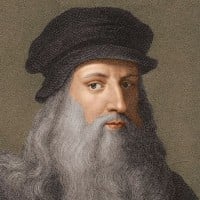 Leonardo da Vinci, an Italian polymath, is often considered one of the most diversely talented individuals in history. While he is most famous for his artistic masterpieces, such as the "Mona Lisa" and "The Last Supper," da Vinci also made significant contributions to the fields of anatomy, engineering, and mathematics. His notebooks contain a wealth of scientific observations and inventive ideas that were far ahead of their time.
Leonardo da Vinci, an Italian polymath, is often considered one of the most diversely talented individuals in history. While he is most famous for his artistic masterpieces, such as the "Mona Lisa" and "The Last Supper," da Vinci also made significant contributions to the fields of anatomy, engineering, and mathematics. His notebooks contain a wealth of scientific observations and inventive ideas that were far ahead of their time. He literally invented ideas that modern society uses. If we all did Leonardo's ideas in his time, we would all be technologically more advanced in modern society.
All the modern-day things are based on his inventions. He did that before Newton, Einstein, and all others.
Leonardo was so much ahead of his time, it's surreal.
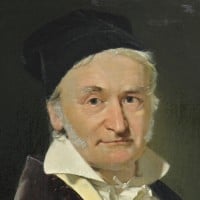 A German mathematician, this scientist made significant contributions to various branches of mathematics, including number theory, algebra, geometry, and statistics. He was also a talented physicist and astronomer, with his work in these fields laying the groundwork for electromagnetism and potential theory.
A German mathematician, this scientist made significant contributions to various branches of mathematics, including number theory, algebra, geometry, and statistics. He was also a talented physicist and astronomer, with his work in these fields laying the groundwork for electromagnetism and potential theory.
 An ancient Greek mathematician, physicist, and inventor, this scientist made significant contributions to geometry, hydrostatics, and the understanding of levers. He is perhaps best known for his famous exclamation, "Eureka!" upon discovering the principle of buoyancy.
An ancient Greek mathematician, physicist, and inventor, this scientist made significant contributions to geometry, hydrostatics, and the understanding of levers. He is perhaps best known for his famous exclamation, "Eureka!" upon discovering the principle of buoyancy. This man discovered pi. That's all that needs to be said. But that's just the tip of the iceberg.
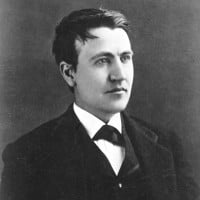 An American inventor and businessman, this scientist developed numerous groundbreaking devices, including the phonograph, the motion picture camera, and the practical electric light bulb. He held over 1,000 patents and is often referred to as the "Wizard of Menlo Park" due to his prolific inventiveness.
An American inventor and businessman, this scientist developed numerous groundbreaking devices, including the phonograph, the motion picture camera, and the practical electric light bulb. He held over 1,000 patents and is often referred to as the "Wizard of Menlo Park" due to his prolific inventiveness. He was not able to hear, but he invented many things like the electric bulb, telegraph, and many more. He was the owner of 1,000 patents.
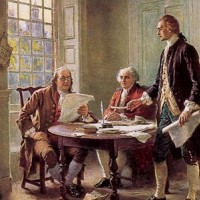 A Founding Father of the United States, this scientist was also a prolific inventor and polymath. He is best known for his experiments with electricity, including the famous kite experiment, and for inventing practical devices such as the lightning rod and bifocal glasses.
A Founding Father of the United States, this scientist was also a prolific inventor and polymath. He is best known for his experiments with electricity, including the famous kite experiment, and for inventing practical devices such as the lightning rod and bifocal glasses. He invented electricity. The image of Benjamin Franklin is on the USA's note.
 A Scottish-born inventor and scientist, this individual is best known for his invention of the telephone, which revolutionized global communication. He also made important contributions to the fields of aeronautics, hydrofoils, and optical telecommunications.
A Scottish-born inventor and scientist, this individual is best known for his invention of the telephone, which revolutionized global communication. He also made important contributions to the fields of aeronautics, hydrofoils, and optical telecommunications. The man who invented the telephone.
 A Hungarian-American mathematician and physicist, this scientist made significant contributions to various fields, including quantum mechanics, computer science, and game theory. He was also a key figure in the development of the atomic bomb as part of the Manhattan Project and is considered one of the founding figures of modern computing.
A Hungarian-American mathematician and physicist, this scientist made significant contributions to various fields, including quantum mechanics, computer science, and game theory. He was also a key figure in the development of the atomic bomb as part of the Manhattan Project and is considered one of the founding figures of modern computing. The fastest mind ever. And possibly the most rawly intelligent person ever.
 An ancient Greek philosopher and polymath, this scientist made significant contributions to various fields, including biology, physics, metaphysics, and ethics. His writings laid the groundwork for much of Western philosophy and science, and his ideas have had a profound impact on the development of human knowledge.
An ancient Greek philosopher and polymath, this scientist made significant contributions to various fields, including biology, physics, metaphysics, and ethics. His writings laid the groundwork for much of Western philosophy and science, and his ideas have had a profound impact on the development of human knowledge. Even though he was wrong in more or less all his notions, he still was the man behind empiric thinking - the principle of all modern science where you test your ideas through practical experiments or create theories judged upon experiences.
Simply put, scientists as we define them wouldn't exist without Aristotle.
 A Danish physicist, this scientist made foundational contributions to the understanding of atomic structure and quantum theory, ultimately developing the model of the atom that bears his name. He received the Nobel Prize in Physics in 1922 for his work on atomic structure.
A Danish physicist, this scientist made foundational contributions to the understanding of atomic structure and quantum theory, ultimately developing the model of the atom that bears his name. He received the Nobel Prize in Physics in 1922 for his work on atomic structure. Deserves as much acknowledgment as Einstein and Rutherford. After all, he created the atomic model we still base our chemistry on to this date.
Why is Bohr so low on the list? It's ridiculous. He deserves top 5.
Genius. Without him, science would not be as it is.
 An English scientist, this individual greatly contributed to the fields of electromagnetism and electrochemistry. He is best known for his discovery of electromagnetic induction, which ultimately led to the development of the electric generator and the modern power grid.
An English scientist, this individual greatly contributed to the fields of electromagnetism and electrochemistry. He is best known for his discovery of electromagnetic induction, which ultimately led to the development of the electric generator and the modern power grid. He's the one who founded one of the key concepts of electromagnetism after he made a discovery in one of his own lab experiments. However, he couldn't explain it mathematically, but only in intellectual terms about the concept. It was not until Maxwell explained the concept further mathematically. Maxwell too faced problems computing equations that describe the behavior of electromagnetic fields. Nowadays, we call it Maxwell's Equations, which consist of 4 laws.
 A Dutch physicist, this scientist is best known for his work on electromagnetism and the Lorentz force, which describes the motion of charged particles in electric and magnetic fields. He also developed the Lorentz transformation, which later became a fundamental part of Albert Einstein's special theory of relativity.
A Dutch physicist, this scientist is best known for his work on electromagnetism and the Lorentz force, which describes the motion of charged particles in electric and magnetic fields. He also developed the Lorentz transformation, which later became a fundamental part of Albert Einstein's special theory of relativity.
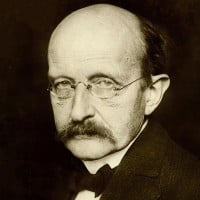 A German physicist, this scientist is considered the founder of quantum theory due to his work on black-body radiation and the quantization of energy. His groundbreaking discoveries earned him the Nobel Prize in Physics in 1918 and had a profound impact on the development of modern physics.
A German physicist, this scientist is considered the founder of quantum theory due to his work on black-body radiation and the quantization of energy. His groundbreaking discoveries earned him the Nobel Prize in Physics in 1918 and had a profound impact on the development of modern physics. An Indian mathematician and astronomer, this scientist made significant advancements in the fields of mathematics and astronomy, including the development of the decimal place-value system and the approximation of pi. His work laid the groundwork for much of classical Indian mathematics and astronomy.
An Indian mathematician and astronomer, this scientist made significant advancements in the fields of mathematics and astronomy, including the development of the decimal place-value system and the approximation of pi. His work laid the groundwork for much of classical Indian mathematics and astronomy. Aryabhata ji deserves first position. Without his discoveries, nothing else would have been discovered.
He gave us zero. Without that, everything and everyone is zero!
He invented 0, which means he invented math...means he invented the computers...
 A German physicist, this scientist is best known for his development of the uncertainty principle, a foundational concept in quantum mechanics. He was also a key figure in the development of nuclear weapons for Nazi Germany during World War II. He was awarded the Nobel Prize in Physics in 1932.
A German physicist, this scientist is best known for his development of the uncertainty principle, a foundational concept in quantum mechanics. He was also a key figure in the development of nuclear weapons for Nazi Germany during World War II. He was awarded the Nobel Prize in Physics in 1932. Developed quantum physics and the Uncertainty Principle. It was so complex and revolutionary, even Einstein couldn't accept it.
(P.S. He won the Nobel Prize at 31, making him the second-youngest person to win it.)
 An English mathematician and computer scientist, this individual is often considered the father of computer science and artificial intelligence. He played a crucial role in breaking the Enigma code during World War II, which greatly contributed to the Allied victory, and later developed the concept of the universal machine, a precursor to modern computers.
An English mathematician and computer scientist, this individual is often considered the father of computer science and artificial intelligence. He played a crucial role in breaking the Enigma code during World War II, which greatly contributed to the Allied victory, and later developed the concept of the universal machine, a precursor to modern computers.